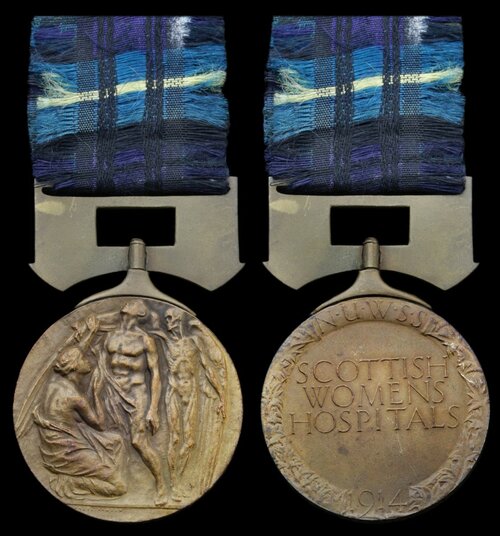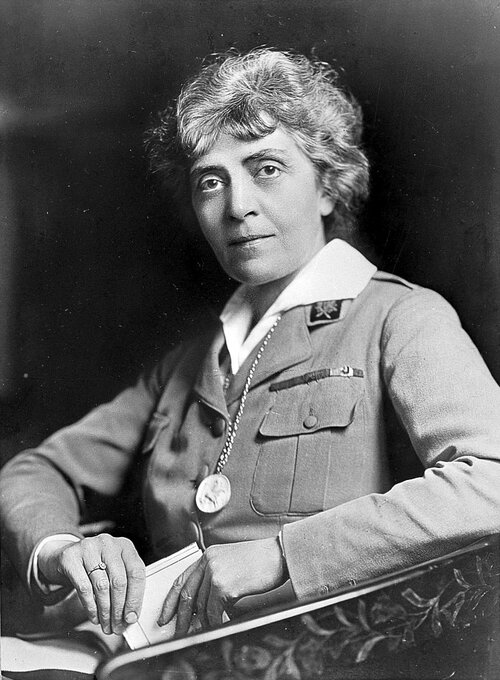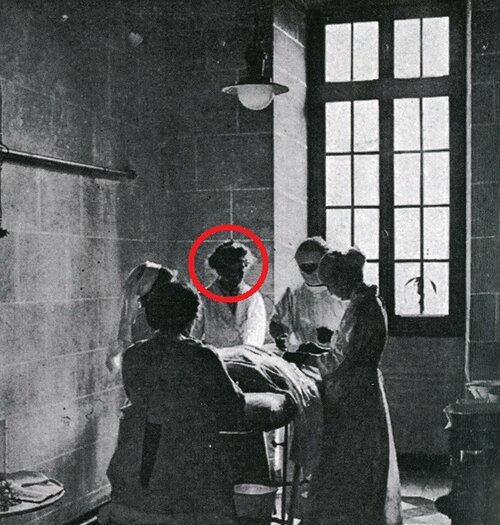Auction: 21001 - Orders, Decorations and Medals (conducted behind closed doors)
Lot: 836
The Scottish Women's Hospitals Medal awarded to Miss M. H. F. Ivens, one of the leading figures in the early field of Obstetrics and Gynaecology and later head of the Scottish Women's Hospital at Royaumont (known as 'Madam la Colonelle' for her leadership), and an active Suffragette
Scottish Women's Hospitals Medal 1914 (Hannah Frances Ivens), nearly extremely fine
Mary Hannah Frances Ivens was born Little Harborough, Warwickshire in 1870. She was the youngest daughter of Elizabeth and William Ivens, who worked as a farmer and timber merchant. She was persuaded to undertake a medical career by one Margaret Joyce, a student at the London School of Medicine for Women. In 1894 she began her own studies at the London School of Medicine for Women.
As well as studying at the LSMW she also performed clinical studies at the Royal Free Hospital as well as time in Dublin and Vienna. She graduated, by 1900, MB with honours in medicine and forensic medicine and the London University Gold Medal in Obstetrics. In 1902 she went on to study for a bachelor’s degree in Surgery and, by 1903, had acquired a Master of Surgery degree, being the third woman ever to do so. She continued to work in London, acquiring the experience she needed in 1907 take up the role of gynaecological surgeon at Liverpool Stanley Hospital and became the head of the new Obstetrics and Gynaecology. In doing this she was the first woman to hold such an honorary position in a Liverpool Hospital. She was also appointed an honorary surgeon of the Liverpool Samaritan Hospital. While in Liverpool she was an active member of the Suffragette movement and was chair of the Liverpool branch of the Conservative and Unionist Women's Suffrage Society.
With the outbreak of war in 1914, Ivens volunteered to join the Women’s Unit in Belgium. However, this unit was forced to withdraw in the face of the German advance and she had to look for another opportunity to serve. This came in the form of the newly created Scottish Women’s Hospital for Foreign Service. In December 1914 she was given the job of leading the unit from the SWH charged with setting up a 100-bed facility in the Abbaye de Royaumont. Royaumont Abbey was in particularly bad shape when the unit first arrived and a great deal of effort was spent trying to prepare it for patients. Despite this, when the French authorities made their first inspection of the place they rejected it. However, in spite of this disappointment Ivens and her team continued to work and finally managed to get the facility functional on 13 January 1915, as Hôpital Auxiliaire 301. She convinced Allied commanders to begin sending cases and soon the 100 beds were continuously filled.
Throughout the war Ivens was known for her diplomacy and fortitude when dealing with issues of morale, the demands of the French Government, or the strains of her job. She was known to regularly give up her own bed if there was a shortage and her concern for the wellbeing of both staff and patients earned her the affectionate nickname ‘Madam la Colonelle’. Through both hard work and personal charm Ivens was able to induce a steady stream of funding from supporters and the 100 beds eventually grew to 600. At its height, doctors at Royaumont would work for 8 days with sixteen hours of sleep and often had to perform surgery by candle light. Ivens was so successful she was asked to set up a second facility at Villers Cotterets in which she operated under shell fire during the German Spring Offensive 1918. This attack eventually forced the evacuation of Villers Cotterets back to Royaumont were the work continued. Ivens pioneered several effective treatments for the treatment of Gas Gangrene and other infections caused by battlefield wounds. Upon the conclusion of the war she was decorated with the Cross of the Legion of Honour by the French President as well as the Medaille d'Honneur des Épidémies and the Croix de Guerre with Palm with the citation reading:
"...having ensured, day and night, the treatment of French and Allied wounded during repeated bombardment at Villers Cotterets in May 1918. On the approach of the enemy she withdrew her unit at the last moment to the Abbaye de Royaumont where she continued her humane mission with the most absolute devotion"
After the Closure of Royaumont in 1919 Ivens returned to work in Liverpool at the Stanley and the Samaritan hospitals. She was also involved in the founding of the Crofton Recovery Hospital for Women and the Liverpool Women’s Radium League. For two years she also took on the role of President of the Medical Women’s Federation, serving from 1924-26. She became the first women to be elected Vice-President of the Liverpool Medical Institution in 1926, also that year being awarded the C.B.E. Outside Liverpool she was a Founder Fellow of the Royal College of Obstetricians in 1930.
Ivens married Charles Matthew Knowles in 1930, moving to London where she continued to work in a private practice. Upon Knowles’ retirement the couple moved to Cornwall, even then Ivens continued to work as County Medical Officer for the Red Cross. During the Second World War she took on the role of Medical Inspector for the Red Cross in Cornwall and helped with an organisation for the welfare of Soldiers and their families.
M. H. F. Ivens died on 6 February 1944 in Killagorden, St Clement, Kent; sold together with copied research including obituaries, transcribed lectures and academic articles.
Subject to 20% VAT on Buyer’s Premium. For more information please view Terms and Conditions for Buyers.
Sold for
£450
Starting price
£280









